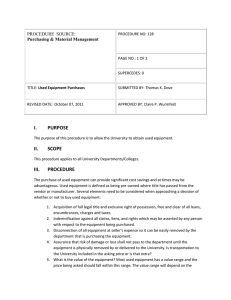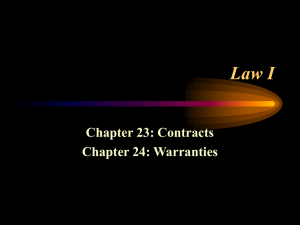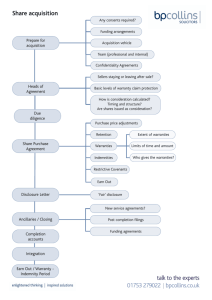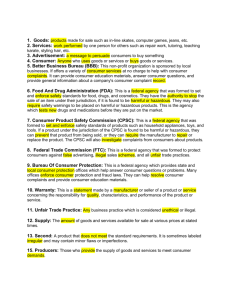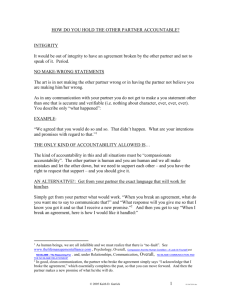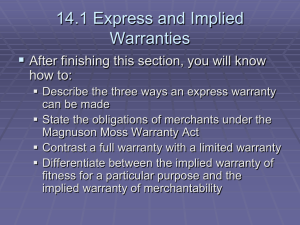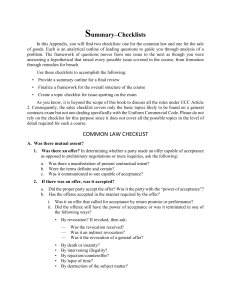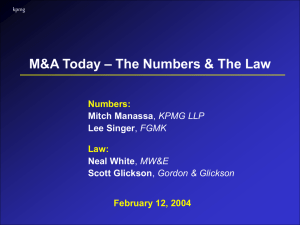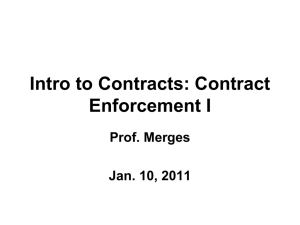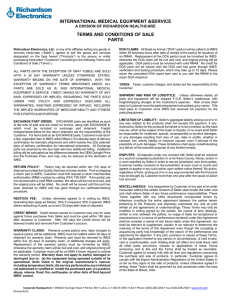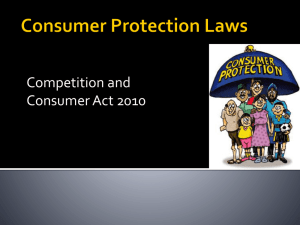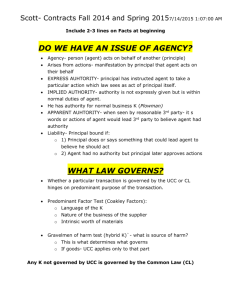Chapter 11
advertisement
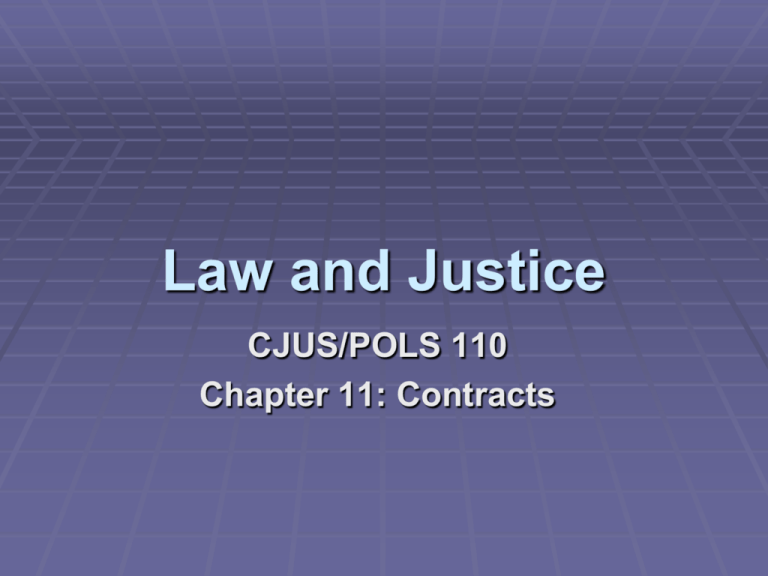
Law and Justice CJUS/POLS 110 Chapter 11: Contracts 1. Contracts - binding agreements - legal consequences - enforced in court a. Provide stability - society = transactions in orderly fashion - not limited to serious business ventures - some are elaborate / formal - others are informal / even implied (1) Stability / certainty - goal of contracts (a) Enter into agreement - failure = court order (b) Requires - specific performance - monetary damages (2) Importance of contract stability - United States Constitution - Article I, Section 10 (a) “No state shall . . . pass any . . . law impairing the obligation of contracts.” b. Terms / wording of contracts - mysterious art - understand terms - understand contracts (1) Express contract - terms stated by parties - oral / written - explicitly states terms - written agreement = specified price (2) Implied contract - not expressed in words - inferred from conduct of parties (a) Enter restaurant - order meal (b) Implied contract - pay listed price - though did not say you would (3) Bilateral contract - promise to do future act - exchange promises (a) Agree to pay for new car - delivery in two weeks (b) Agree to pay for painting of house - weather good in one month (c) Entered a bilateral agreement - it is a valid contract - requirements on both parties (4) Unilateral contract - only one party to contract - makes an offer (a) Lost dog - pay $100 for return (b) Pay $1000 to drive car - Chicago to Seattle (5) Executory contract - some / all of terms uncompleted - by one / both parties (a) Contract sets forth - promises not yet performed (6) Executed contract - all terms have been completed (a) Ate your meal - paid bill (b) Got dog back / house was painted c. Breach of contract - terms: void / void able / unenforceable arise (1) Void contract - nullified from beginning - no damages can be collected (a) Could never be completed - impossible task / act (b) Crime required - unlawful contract (c) Age of participant - under 18 - cannot enter into (2) Voidable contract - binding - until disaffirmed / canceled - by party with authority (a) Marriage - contract - canceled by divorce (b) Time limit - allowed to rent house - until owner returns (3) Unenforceable contracts - lack a legal requirement (a) Not signed in front of notary (b) Not of legal age to sign (c) Over $500 must be in writing 2. Formation of contracts - two or more parties - legal capacity (age / mentality) - offer / acceptance = offeror / offeree - supported by consideration / obligation a. Six requisites for valid contract (1) Competent parties - legal capacity - must be rational - freedom of will / freedom of choice - may be negated due to: (a) Infancy / minority - under 18 in most states (b) Incapacitating mental condition - not know nature / consequences (c) Incapacitating intoxication - under influence - drugs / liquor - medications (2) Mutual agreement - both parties agree - offer = acceptance - offeree accepts terms offered (3) Reciprocal consideration - value given in exchange - for a promise / act - one pays / one does the job (4) Genuine asset - parties give real consent - not under duress / intoxication / fraud / mutual mistake (5) Legality in formation / execution - must be legal - follow state law (a) License - if required for business (b) Crime - cannot be contract for illegal act (c) Violates public policy - filled with lies (6) Form prescribed by law - states require certain forms - contract to be legal 3. Contracts: Rules of Construction - need for clarity in language - terms frequently disputed - courts / legislatures devised laws - deal with controversies a. Statute of frauds - foremost tool - certain contracts in writing = enforceable - contrary to rule for verbal contracts b. Depending on state laws - contracts required (1) Affecting interest in land - sale of real property (sell home) - creation of lien (property as collateral) (2) Prenuptial agreements - made in contemplation of marriage - own property before entering wedlock - maintain separate checking / savings (3) Not performed in one year - construction = two / three years (4) Involves a surety - sum of money - placed into an account - surety deposit (5) Sale of goods - value over a set amount - Uniform Commercial Code = $500 - vary = state law 4. Parol Evidence Rule - critical - formation of written contract - only items in contract will be considered - court = only look at what is written in contract a. Earlier negotiations - contemporaneous oral agreements - irrelevant (1) Parole Evidence Rule / Statute of Frauds - ensure certainty / stability - contractual relationships (2) Other rules developed = not clear (a) Language in contract - interpreted in usual meaning (b) Breach of contract - frequent occurrence - years to resolve - cost 1,000s to millions (c) Repudiation - withdraw from a contract (d) Promissory estoppel - court = carry out promise 5. Business relationships - most contracts - transactions among business entities a. Sole proprietorship - most basic business structure - home business/professional solo practice (1) Single owner - profits alone from business - suffers losses alone (2) Liability - all debts / bills = single owner - no legal barrier - personal assets subject to claims (3) Report profits / losses - personal income tax form b. Partnerships - characteristics of sole proprietorship - primary difference - two or more people - corporations involved (1) Partnership agreements = contracts - outline arrangements for managing - indemnification: hold harmless - dissolution of partnership - division of assets (2) Must follow statutes - Uniform Partnership Act - Uniform Limited Partnership Act (3) Like sole partnerships - report share of profits / losses - personal income tax return (a) General partnerships - all participate in decisions - appoint managing partner (b) Silent partner - not identified as having interest (4) Each shares: - individual / joint liability - all debts / torts (5) Limited partnership - responsibility - extent of investments c. Corporations - most complex - chartered by state (permit issued) - Certificate of / Articles of Incorporation (1) Primary difference - shielded owners (shareholders) - from individual liabilities (a) Assets of corporation - compensation = debts / torts (b) Corporations - come in all sizes - multi-national conglomerates - family owned corporation - factories to a single ranch (2) Justice Swayne – 1878 “A compact lies at the foundation of all national life. Contracts mark the progress of communities in civilization and prosperity. They guard, as far as possible, against the fluctuations of human affairs. They seek to give stability to the present and certainty to the future. They gauge the confidence of man in the truthfulness and integrity of his fellow man. They are the springs of business, trade and commerce. Without them society could not go on.” 6. Consumer protection - individual consumer contracts - all persons are consumers - most common agreement = sales agreement a. Sellers prepare agreement - attorneys draft contact - legalese = hard to understand - difficult to read (1) “Adhesion contracts” - prepared by dominant party (seller) - presented to other party (buyer) - take it or leave it option - “adhering party” (2) Adhesion contract - “shock the conscience” (a) High interest rate - long payout period - large payment upfront - balloon payment - other “unconscionable clause” (b) Courts can overturn - individual lacks knowledge - understand contract b. To protect consumer - three categories legislation passed - before sale / during sale / after sale laws (1) Before-sale-laws - regulate design / makeup / production - quality / safety / purity of products - among others (a) Pure Food & Drug Act – 1906 - first step by federal regulators - control consumer goods - control harmful drugs (b) Consumer Product Safety Comm. - established in 1972 - protect consumers - certain items - other agencies do not address (2) During-sale-laws - regulate truth in advertising / credit / contracts (a) Federal Trade Commission - established 1914 - control items crossing state lines (b) Consumer Credit Protection Act - established 1968 - truth-in-lending laws (c) Credit Card Act - 1970 - control practices of companies (d) Fair Credit Reporting Act – 1970 - check credit history on self (e) Equal Credit Opportunity Act – 1974 - forbids discrimination in credit (3) After-sales-laws (a) Fair Credit Billing Act – 1974 - check credit card bills / other bills - notify within 60 days - creditor = investigate / respond - promptly = 60 to 90 days - eliminate error / state why correct (b) Fair Debt Collection Practices Act - established 1977 - outlaw harsh collection tactics - late night / early morning calls - obscene / abusive language - false misrepresentation - saying a police officer c. Warranty protection (1) Warranty of conformity of: - model / sample / item exhibited - conform to sample examined / tested (2) Warranty of conformity of: - seller’s statement / promise - perform as seller said it would - live-up to promise made (3) Warranty of merchantability - important warranty - be fit for purpose made for - functions properly - expected period of time (a) Seller can place disclaimer - you buy “as is” (b) Must be made aware of disclaimer - agree to accept
